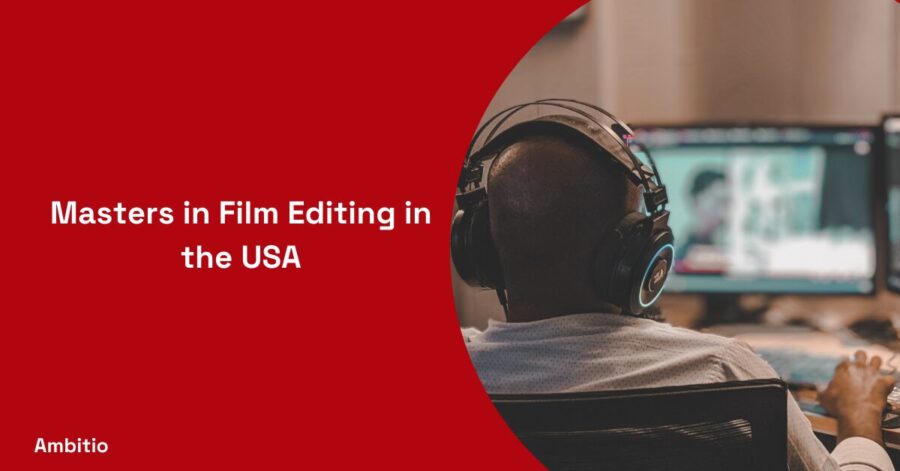11 December 2024
7 minutes read
Masters in Film Editing in the USA

Key Takeaways
- 2024’s film master’s programs focus on digital media, screenwriting, and cinematography.
- Leading institutions like USC and NYU offer specialized film editing and production tracks.
- Admissions require a bachelor’s degree, portfolio, recommendations, and sometimes tests.
- Career paths include film editor, cinematographer, and director, with varied salaries.
- Programs evolve with industry trends like digital cinematography and interactive media.
Introduction
In 2024, the landscape of film and television is more dynamic than ever, making a degree in film a valuable asset for those aspiring to join this vibrant industry. Master’s programs in film, particularly in film editing and production, have evolved to meet the demands of a digitally-driven era.
These graduate programs offer comprehensive training in digital media, cinematography, and screenwriting, preparing students to excel in the fast-paced world of cinematic arts.
Graduate programs in film and media focus on developing both technical skills and creative vision. Students learn to navigate the intricacies of film editing, understand the nuances of film and television production, and explore the realm of visual storytelling.
The best master’s degrees in film for 2024 are designed to equip students with a profound understanding of the filmmaking process, from concept to post-production.
Comprehensive Course Overview
The core curriculum of these programs is meticulously designed to cover all facets of film and media production. Students are immersed in a variety of subjects, including film analysis, digital media, cinematic arts, and screenwriting. Key components of these courses often include:
- Film Production: Understanding the practical aspects of filmmaking, including directing and cinematography.
- Screenwriting: Learning the craft of writing for film and television.
- Cinematography: Exploring the art of visual storytelling through camera work and lighting.
- Digital Media: Keeping pace with emerging technologies in film and media.
Top Film Schools for Master’s Degrees in Film Editing

In 2024, several prestigious institutions stand out for their exceptional film and media production programs. These schools not only provide a solid foundation in film editing and production but also offer unique opportunities for hands-on experience and industry networking. Notable schools include:
| Rank | University/Institution | Program Name | Location | Key Features |
|---|---|---|---|---|
| 1 | University of Southern California (USC) | MFA in Film and Television Production – Editing Track | Los Angeles, CA | Comprehensive curriculum, strong industry network, technical focus |
| 2 | New York University (NYU) | MFA in Film – Editing Track | New York City, NY | Extensive training in editing, narrative, sound, and post-production |
| 3 | UCLA | MFA in Film and Television | Los Angeles, CA | Emphasizes visual storytelling, industry access, diverse coursework |
| 4 | American Film Institute (AFI) | MFA in Film Editing | Los Angeles, CA | Hands-on, collaborative program with direct industry access |
| 5 | DePaul University | MFA in Film and Television – Editing Concentration | Chicago, IL | Blends Theory with Practice offers advanced editing workshops |
| 6 | NYFA (New York Film Academy) | MA in Film and Media Production | Various Locations | Intensive, one-year program with a strong focus on film theory and production |
| 7 | Savannah College of Art and Design (SCAD) | MFA in Film and Television | Savannah, GA | Comprehensive program with access to state-of-the-art technology |
| 8 | Loyola Marymount University | MFA in Film and Television Production | Los Angeles, CA | Focuses on storytelling, offers personalized mentorship |
| 9 | Columbia University | MFA in Film | New York City, NY | Renowned for its narrative focus and critical analysis |
| 10 | Boston University | MFA in Film and Television Studies | Boston, MA | Offers interdisciplinary approach, combining production with theory |
Entry Requirements and Application Process
Gaining admission to a Master’s program in film and television production requires careful preparation. Common entry requirements include:
- Bachelor’s Degree: Most programs require an undergraduate degree, preferably in a related field like film, media studies, or the liberal arts.
- Portfolio: A collection of work demonstrating your film editing or production skills.
- Letters of Recommendation: Typically from academic or professional references.
- Statement of Purpose: An essay explaining your interest in the program and career aspirations.
Quick Tips!
- Research and choose a program that aligns with your career goals, considering factors like curriculum, faculty, and industry connections.
- Prepare a strong application by showcasing your best work in your portfolio and articulating your passion for film in your statement of purpose.
- Stay informed about the latest industry trends and technologies to enhance your skills and adaptability in the evolving field of film and media.
Application Process
Applying to a Master’s program in film production and editing involves several key steps. Here’s a detailed guide to help you navigate the application process:
Step 1: Research and Select Suitable Programs
- Start by researching various film schools and their Master’s programs.
- Consider factors such as program curriculum, faculty, location, and alumni success.
- Shortlist programs that align with your career goals and interests.
Step 2: Check Eligibility and Requirements
- Visit each school’s website or contact the admissions office to understand their specific eligibility criteria and application requirements.
- Common requirements include a Bachelor’s degree, a portfolio of work, letters of recommendation, and a statement of purpose.
Step 3: Prepare Your Application Materials
- Develop a strong portfolio showcasing your best film or media-related work.
- Request letters of recommendation from academic or professional references.
- Write a compelling statement of purpose explaining your interest in the program and your career aspirations.
Step 4: Take Required Standardized Tests (if applicable)
- Some programs may require standardized tests like the GRE. Check the specific requirements for each program.
- Prepare for and take any required tests well in advance of the application deadlines.
Step 5: Submit Your Application
- Fill out the application form for each program, either online or through mail, as specified by the institution.
- Attach all required documents, including your portfolio, letters of recommendation, statement of purpose, and test scores.
Step 6: Pay the Application Fee
- Most programs require an application fee. Ensure you pay the fee to complete your application process.
Step 7: Attend Interviews (if required)
- Some programs may invite shortlisted candidates for an interview, either in person or online.
- Prepare to discuss your portfolio, experiences, and motivation for pursuing the program.
Step 8: Await Admission Decisions
- After submitting your applications, wait for admission decisions from the schools.
- Admission decisions are typically communicated via email or through the application portal.
Step 9: Evaluate Offers and Make a Decision
- Once you receive admission offers, compare the programs in terms of curriculum, opportunities, and financial implications.
- Consider visiting the campuses, if possible, to get a feel for the environment and facilities.
Step 10: Accept an Offer and Prepare for Enrollment
- Once you’ve made your decision, accept the offer by the specified deadline.
- Complete any additional steps required for enrollment, such as submitting final transcripts or securing housing.
Step 11: Apply for Financial Aid or Scholarships
- Investigate financial aid options, including scholarships, grants, and loans.
- Apply for financial assistance to help manage the costs of the program.
Step 12: Prepare for Your New Academic Journey
- Arrange for accommodation, transportation, and other logistics.
- Attend orientation sessions and prepare to embark on your academic journey in film production and editing.
Popular Career Options

A degree in film opens doors to a multitude of career paths in the film and television industry. Graduates of these programs can pursue roles such as:
| Career Option | Description | Typical Salary Range |
|---|---|---|
| Film Editor | Responsible for selecting and assembling the video footage, and shaping the film’s narrative and rhythm. | $45,000 – $100,000+ |
| Cinematographer | Oversees the camera and light crews, responsible for the visual look of the film. | $50,000 – $120,000+ |
| Screenwriter | Creates scripts for films, television shows, and commercials, developing characters and plots. | $60,000 – $150,000+ |
| Director | Guides the creative aspects of the film, oversees the cast and crew, and shapes the film’s artistic vision. | $70,000 – $200,000+ |
| Production Designer | Responsible for the overall visual appearance of the film, creating the setting and style. | $50,000 – $120,000+ |
| Sound Designer | Creates the auditory elements of a film, including sound effects, music integration, and dialogue editing. | $40,000 – $90,000+ |
| Visual Effects Artist | Uses software to create digital effects, enhancing the film’s visual elements. | $50,000 – $120,000+ |
| Television Producer | Oversees the production of television shows, managing budgets, schedules, and creative decisions. | $60,000 – $150,000+ |
| Documentary Filmmaker | Develops and produces documentary films, often focusing on real-life subjects and events. | $45,000 – $100,000+ |
| Film Professor | Teaches film courses at colleges or universities, often combining academic research with practical instruction. | $50,000 – $110,000+ |
Cinema is a matter of what’s in the frame and what’s out.
– Martin Scorsese, filmmaker.
Cost and Financial Assistance
The cost of pursuing a Master’s degree in film can vary widely depending on the institution and program length. Many schools offer financial aid, scholarships, and grants to help offset the expenses. Students need to research the total cost, including tuition, fees, and living expenses, and explore financial aid options.
| University/Institution | Program Name | Estimated Tuition Cost (per year) | Financial Assistance Options |
|---|---|---|---|
| University of Southern California (USC) | MFA in Film and Television Production – Editing Track | $60,000 – $70,000 | Scholarships, Grants, Work-Study, Student Loans |
| New York University (NYU) | MFA in Film – Editing Track | $58,000 – $68,000 | Scholarships, Financial Aid Packages, Assistantships |
| UCLA | MFA in Film and Television | $32,000 – $42,000 (In-State) $45,000 – $55,000 (Out-of-State) | Scholarships, Grants, Fellowships, Teaching Assistantships |
| American Film Institute (AFI) | MFA in Film Editing | $60,000 – $70,000 | Scholarships, Financial Aid |
| DePaul University | MFA in Film and Television – Editing Concentration | $35,000 – $45,000 | Scholarships, Graduate Assistantships, Student Employment |
| NYFA (New York Film Academy) | MA in Film and Media Production | $40,000 – $50,000 | Scholarships, Financial Aid, Military Benefits |
| Savannah College of Art and Design (SCAD) | MFA in Film and Television | $38,000 – $48,000 | Scholarships, Grants, Work-Study, Student Loans |
| Loyola Marymount University | MFA in Film and Television Production | $50,000 – $60,000 | Scholarships, Financial Aid Packages, Work-Study |
| Columbia University | MFA in Film | $68,000 – $78,000 | Fellowships, Scholarships, Grants, Student Employment |
| Boston University | MFA in Film and Television Studies | $55,000 – $65,000 | Scholarships, Financial Aid, Graduate Assistantships |
Trends and Future in Film and Video Production
The field of film and video production is continually evolving, driven by technological advancements and changing audience preferences. Master’s programs in film and media production are adapting to these changes by incorporating emerging technologies and new media formats into their curricula. Key trends include:
- Digital Cinematography: The shift towards digital cameras and advanced filming techniques.
- Interactive Media: Exploring new ways to tell stories through interactive and immersive media.
- Virtual Reality (VR) and Augmented Reality (AR): Incorporating VR and AR into filmmaking for a more engaging viewer experience.
- Streaming Platforms: Adapting to the rise of streaming services and their impact on film production and distribution.
Note: These trends highlight the importance for film students to stay abreast of the latest developments and be prepared to innovate in their future careers.
The future of film is in the hands of the next generation of storytellers.
– George Lucas, filmmaker.
Conclusion
Choosing the right Master’s program in film production and editing is a crucial step for anyone aspiring to a career in this dynamic and creative field. These programs offer the skills, knowledge, and experience needed to succeed in the competitive world of film and media.
With dedication and passion, graduates of these programs are well-equipped to make their mark in the industry and contribute to the evolving landscape of film and television.
Empower your professional journey by joining Ambitio Pro. Our holistic approach to career advancement offers a blend of personal development, skill-building, and strategic planning, ensuring you’re not just advancing in your career, but thriving.
FAQs
What are the career prospects after completing a Master’s in Film Production and Editing?
Graduates can pursue careers as film editors, cinematographers, screenwriters, directors, and more, in film studios, production companies, and independent filmmaking.
Can I specialize in a specific area of film production in my Master’s program?
Yes, many Master’s programs offer specializations in areas like digital media, screenwriting, and television production, allowing you to tailor your education to your career goals.
What is the typical duration of a Master’s program in Film Production and Editing?
Most Master’s programs in film production and editing are 1-3 years long, depending on the institution and the specific degree structure.
Do I need a background in film or media for admission to these Master’s programs?
While a background in film or related fields is beneficial, many programs also consider candidates with diverse academic backgrounds, provided they demonstrate a strong interest and potential in film production.
Are there opportunities for hands-on experience in these Master’s programs?
Yes, these programs typically include workshops, collaborative projects, internships, and thesis films, offering extensive hands-on experience in real-world film production settings.

You can study at top universities worldwide!
Get expert tips and tricks to get into top universities with a free expert session.
Book Your Free 30-Minute Session Now! Book a call now




























